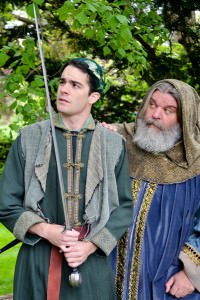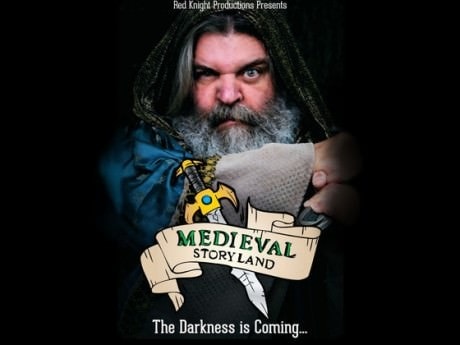Medieval Story Land at Fringe: Elves, Wizards, Knights Clash in Fantasy Parody
I was sick of the poop and fart jokes. I was sick of veiled sexual innuendo. I was sick of unveiled sexual innuendo. It was 2009, and I was writing and performing in New York’s premier theatre for sketch and improv comedy, the Upright Citizens Brigade Theatre. Founded by Amy Poehler, this literally underground theatre was home to the smartest, sharpest, funniest actors in New York. UCB was celebrating Bobby Moynihan, its first performer to make it to Saturday Night Live. Every week UCB performers were churning out hours of original theatre that appealed both to “sophisticated” New York hipsters and casual all-american tourists. Comedy at UCB was cerebral and it was edgy, but to stay edgy in New York, it’s hard to stay out of the gutter. Despite the seeming success, I was growing sick of “edgy.”

I had just come out of a show with a sketch in which a convicted pedophile going door to door in accordance with Megan’s Law was mistaken for a stripper and forced to dance at a bachelorette party. I stayed on to watch the next show. It ended with an obese man trying to lose weight standing on a scale in his boxers and releasing a 2-minute fart that took off the last few pounds he needed to meet his goal.
There had to be something more.
My own growing distaste for the lowest common denominator coincided with a mandate from UCB’s Artistic Director, Anthony King. Anthony was dissatisfied for a different reason. He thought the writers were getting lazy, taking whatever their most recently written sketches were, slapping them together and calling them a show. A show, Anthony explained should have some sort of through-line. A show should be cohesive. A show should be about something, not just a random collection of scenes, no matter how funny they may be individually.
Anthony’s directive resonated with me. I decided I would write a show “about something.” And I had a theory: if a show had a good enough story, compelling enough characters, and enough charm, even the artsy hipsters wouldn’t miss the pedophiles. And I had a secret weapon – the story. I’d use humor to hook them, but they would find that somewhere along the way they would forget to be cynical, and just lose themselves in the story. I was a genius!
Now I just needed an idea.
The cliched advice for writers is to write what you know. What did I know? My mind wandered back to childhood. I remembered my friends and I chasing each other with sticks pretending to be knights and wizards. We weren’t Dungeons and Dragons nerds… but we were friends with some. I remembered reading The Lord of the Rings for the first time in eighth grade. I only got half-way through The Two Towers, but I saw all three movies when they came out a few years later. I thought of my college paper exploring the effect of the Norman invasion of England on Arthurian legend. My magnum opus would be a fantasy story, a myth, a legend. It would be clean, and it would be funny.
I would write a parody.
I started with a cast. A group of us had been performing together since college, and I decided that I would design each character around an actor. I always wanted to be a knight, so my part was easy, as I crafted an Obi-wan Kenobi-esque part for myself. I would be the grisled wise old warrior. Jerry was a five-foot catholic Indian who was was being worked to the bone in one of New York’s premier talent agencies. He would be a gruff womanizing dwarf. David was the brainiac. He had just taught himself to code for Flash, and was famous for expounding on why Mathematics was the only pure science. He would be the grandiloquent wizard. Seth was the funniest. His acting career was flourishing and there was nothing he couldn’t play. So he became the self-hating troll. I had everything except a protagonist. My friend Todd, who was working for Conan O’Brien at the time, was something of a golden retriever of a person. He was famous for asking profound questions like, “How much do you think a bag of sand costs?” I decided Todd could star as himself.
I spent the next several months writing scenes out of order, making intricate web diagrams of relationships, and taking long 2:00 am brainstorming walks from my Queens apartment to the East River and back. I read all of Joseph Cambell’s seminal work The Hero With a Thousand Faces because I remembered something about George Lucas reading it when he was writing Star Wars. At certain points it seemed to write itself, but the process was more like fitting a puzzle together than anything linear I remember writing the climactic battle scene and then asking myself, “Well, how the hell do I get here?”
The script grew. It became more complex. Five characters became twenty, and then forty. When I had my first full draft I immediately got in touch with Anthony King. I told him I had a show he had to hear. I pulled in actors to play the pantheon of new roles. I bought Vienna Fingers cookies and waters for the reading. I printed fifteen scripts at FedEx/Kinkos. The chairs were set up in a circle. Then for the first time the world heard my brilliant words out loud. They were funny. The story was engrossing. The characters endearing.
The show was too long.
Shows at UCB were held to a strict half-hour limit. This show was well over an hour. No matter, I had told myself. It’s genius. Though Anthony liked the script, he couldn’t produce it he said. I had taken his mandate too far. “Maybe you should produce it for the New York Fringe Festival,” he said, before politely excusing himself. A year later I was back in Maryland.
Fifteen copies of Medieval Story Land sat in a moving box in my parents’ basement. I taught high school theatre. I did some acting. I met a cute girl named Katie on set for a Weis Market commercial. I gave her my number. A few weeks later my parents forced me to get all my junk out of their basement. Katie had come over and I pulled a wrinkled script out of a box. “Here’s some reading material,” I said and then went to take a shower.
I found her on the balcony. She was at the part where Todd meets his doppelganger at the joust. “You wrote this?” she asked.
“Yup,” I said.
“You should produce it.”
**********************************************************************************
Medieval Story Land
by Scott Courlander
At The Studio Theatre’s Milton Theatre
1501 14th St., NW
Washington, DC 20005
Performances:
July 17 – 9:30 p.m.
July 20 – 7:30 p.m.
July 22 – 3:00 p.m.
July 28 – 7:15 p.m.
July 29 – 12:00 p.m.
Order tickets starting June 18th here.
Lord of the Rings meets Forrest Gump meets Monty Python in this fast-paced parody of the medieval fantasy genre.
Featuring furious swordplay and a gripping plot, the show not only appeals to hobbit-loving fantasy appreciators, but to anyone who likes a good story or likes to laugh. Medieval Story Land, written by Scott Courlander and directed by Guillaume C. Tourniaire, is an action-packed adventure that embodies the irreverent flavor of sketch comedy.
The show takes place in the aptly named Medieval Story Land, home to trolls, knights and wizards. When Todd, a simpleton elf with a heart of gold, is given a magical sword, he must venture off on a dangerous quest to save Medieval Story Land from the certain destruction of the Dark Wizards of Dark Wizard City and the Dark Black Darkness. Audiences will be treated to twelve actors playing over forty different characters during this one-hour whirlwind of a show.






Wait til you see the sword fight scenes!! I want to learn how to do that!! ATTENTION FAMILIES: I saw this show late last night and may not make it to work today. But I’m coming back Sunday afternoon and am going to round up kids to see it. We’ll leave the swords at the door.